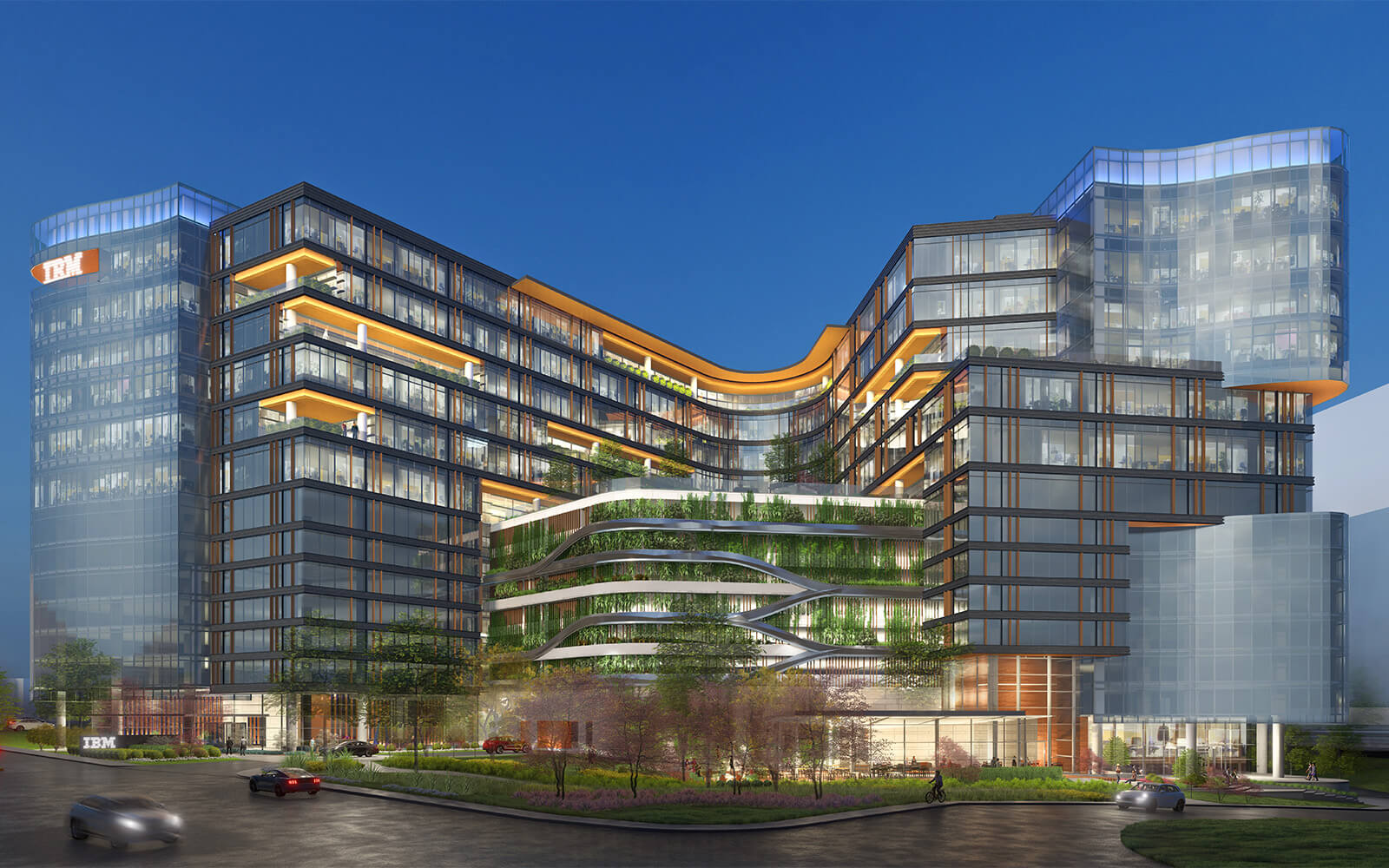|
Getting your Trinity Audio player ready...
|
When asked about the aspirations that led him to his current position at IBM, Danny Donev says that his career sights were very much rooted in both the future and the past. “IBM holds the prestigious title of being the world’s oldest tech company, underscoring its legacy in the industry,” he explains.
But his enthusiasm is also forward facing. Donev wanted to be a part of a larger narrative at a company that is shaping how our world would operate in the future. With all its cutting-edge technology and transformative potential, that is undoubtedly IBM.
“IBM stands at the forefront of quantum computing. That, together with the hybrid cloud and AI [artificial intelligence] advancements that IBM has, made the decision to join IBM very easy. For me, it meant that I’d be able to contribute and play a small role in a very large vision,” he says.

Courtesy of Hines
As IBM’s head of design, construction, and workplace strategy within the Americas, Donev applies the extensive expertise acquired over 12 years of working in design and construction to build everything from traditional offices to cutting-edge labs, client centers, and data centers—all centered around the IBM employee.
“At IBM, we have a very diverse array of workplaces. But across this whole spectrum, there is one key element that is always up front,” Donev says. “That is the IBMer, the employee: the heart of the company. We develop the workplace strategy based on them, which then influences the design and construction of the space.”
Currently, Donev is spearheading three major projects: a hub in Austin, Texas; a flagship location in New York City; and a quantum computer space in Yorktown, New York.
“Our mission in global real estate at IBM, and not just my organization, is to ensure that IBMers have an environment that truly embodies inclusivity and nurtures innovation. But, also to develop spaces that place a strong emphasis on wellness, brand identity, and corporate culture,” Donev says. “This complete synergy between design, construction, [and] workplace strategy is really the key, and it’s pivotal in creating these spaces that are empowering IBMers to thrive.” Those are the standards that each project, past and future, is based on.
The New York City flagship space, for instance, will consolidate 10 different New York City IBM offices into one space—providing the company’s employees, clients, and external partners with the type of modern and dynamic experience they need to attract the kind of talent that will keep them at the forefront of innovation.
“There is one key element that is always up front. That is the IBMer, the employee: the heart of the company. We develop the workplace strategy based on them, which then influences the design and construction of the space.”
Danny Donev
Taking into consideration the different cultures, religions, and IBM’s high standards for inclusivity, the construction covers everything from prayer rooms to lactation rooms for new parents.
Similarly, Donev is leading the construction of another hub going up in Austin, Texas—a city that he claims depicts every aspect of IBM’s business. “We have AI, cloud, software, systems, consulting, marketing, sales, and communications. Anything that you can think about IBM is represented in Austin,” he says.
Set to be completed by 2027, the construction will bring multiple IBM office sites under one roof within the Domain, one of the city’s most up-and-coming and desired residential areas. The hub comprises a grand total of 320,000 square feet and will feature its own private lobby in an entire 14-story tower of office space.
In addition to providing a great workplace for employees (as is happening with the New York City and Austin hub), the quantum computer space, also referred to as “Quantum System 2,” is the next stage of quantum computing, set to be completed at the end of this year.
With over 20 Quantum System 1 computers in both Poughkeepsie and Yorktown, New York, IBM holds the largest and highest-performing fleet of quantum systems in the world. The Quantum System 2 is a modular, extendible system that will be a building block for future quantum systems as IBM’s impressive fleet continues to grow.

Managing multiple projects in multiple locations with various external partners in conjunction with his own internal teams requires a certain degree of synergy from Donev—something he believes each project relies on to be successful.
“Both the internal and external teams must be completely aligned and collaborate very closely on each job,” Donev says. However, as a leader, his role is much more situational. “I adapt to the specific needs of the individuals or groups that I’m working with, actively practicing situational leadership,” he explains. “I always listen to and empathize with the needs of my team, where my leadership style depends on the task and the skill set of the individual or group.”
External partners are quick to agree. “Our work with Danny and his team is built on solid collaboration, timely communication, and a clear alignment around IBM’s desire to deliver first-rate results, whether for large metro consolidations, highly technical spaces, or infrastructure work,” says Ian King, JLL global account director for the IBM Account.
Even with a number of completed and ongoing projects under his belt, Donev looks toward the future. “There’s definitely going to be a lot of interesting and intriguing projects that my team will get a chance to be a part of,” he says. “As we continue to refine our portfolio to align with our evolving technology, I’m looking forward to providing an impactful outcome.”
JLL (NYSE: JLL), a leading global commercial real estate and investment management company, helps clients buy, build, occupy, manage, and invest in a variety of commercial, industrial, hotel, residential, and retail properties. A Fortune 500® company with operations in over 80 countries, we bring the power of a global platform combined with local expertise and tailored technologies. Driven by our purpose to shape the future of real estate for a better world, we help our clients, people, and communities SEE A BRIGHTER WAYSM. We enable IBM’s spaces to inspire collaboration and innovation.


